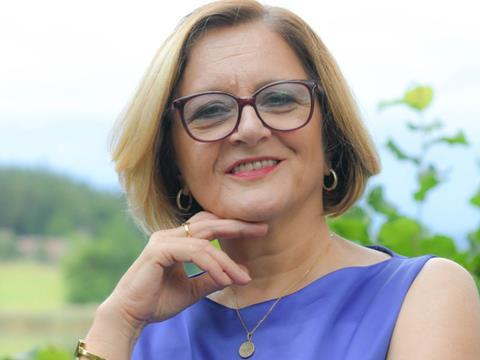
Dana Mosora is a passionate circular economy advocate, currently working as a workstream consultant for CEFLEX, and also a social entrepreneur who has co-founded the ASASE Foundation, an NGO based in Ghana which offers seed money and technical and business training to aspiring entrepreneurs to build their own plastic waste reprocessing plant.
In this column Dana draws on her experience in Africa to argue that industry should play a key role in empowering local communities to recycle and create value from their own plastic waste – generating unexpected additional social benefits.
When children go to school in Accra, Ghana they need daily money to buy sachets of water (0.22 US dollar cents per day). The food is cooked on school premises and is paid for by the government. So, the deal is quite good!
But this might change… because those sachets, which today make clean water accessible to all children of Ghana, might not be available if the sachets are banned by the government.
Why would they be banned? Because they are single-use packaging and the call from environmentalists to ban single-use packaging in a country like Ghana started from a lack of a formal or efficient system in place to get those sachets, or the PET bottles, back from the streets of Accra and to recycle them, returning the polymers back into the economy.
What this has taught me, in such a simple way, is that you can have only mono-material packaging, like almost all of the packaging in Ghana, and still be at the root cause of this terrible plastic litter problem.
What I see, as a common problem all over the world, is not what type of packaging we, the industry, put on the market but how we take our share of the responsibility to manage plastic packaging when it becomes waste. The common problem, in all geographies and types of markets, is when packaging after its first use is not disposed for recycling.
So how can we take our share of responsibility to manage this plastic packaging waste?
Let me share how Francisca, a middle-woman for water sachets in Katamanso, Accra inspired me to answer this question: she learned that we, the ASASE Foundation (www.asasegh.com), were starting a plastic recycling plant in her community. She thought: if she wants to get the biggest share in our business then she needs to collect as much as she can and provide us with clean material, of reliable quality, each time.
On her own initiative, she bought plastic bags and placed them at people’s homes all over her neighbourhood. Once a week, she tours her area and picks up only the plastic which was put into the bags, segregated from the other waste. She knows that, in this way, she will get the quality of waste we need for our plastic reprocessing plant, and we will prefer to buy from her, giving her our biggest share of spending. She created her own model of collection of segregated plastic waste, winning our trust and support to scale it up.
Who lost? All those waste pickers who sell water sachets picked from the streets, full of dirt and water, which make the bags weigh more but which make the quality very poor. In fact, many times they pick up the sachets and can’t sell the bags. Recyclers like us lose money by having to dispose of the dirt brought together with contaminated water sachets so we can’t buy the bags from them.
Segregation at the source and collection with recycling in mind made Francisca the preferred supplier and the proof of one key principle of the circular economy in action: all plastics have a value in use and after use, so consumers need access to ways of disposing of plastic packaging after use, so that it will be collected for recycling!
Who should support the Franciscas of this world to drive segregation at the source and to create more collection for recycling in the way our Francisca is doing in her community in Katamaso, Accra?
Well… I think it is the industry putting that plastic on the market in the form of packaging. We need to help create, in these regions from where the ocean litter is generated, the infrastructure which is necessary to make collection happen. By using the know-how we already have we can develop the financing system for the segregated collection and sorting for recycling.
If we aim to be leaders in innovation and continue to grow our respective businesses then this is a rite of passage for taking responsibility and showing our leadership in the plastic packaging industry.













